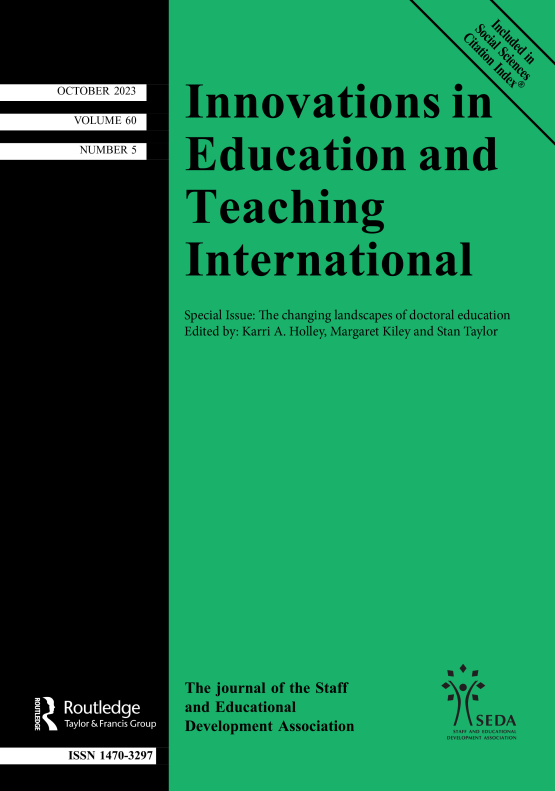Submit a Manuscript to the Journal
Innovations in Education and Teaching International
For a Special Issue on
Artificial Intelligence (AI) in Higher Education: Impacts on Learning, Teaching, Assessment, and Educational Development
Manuscript deadline
15 November 2024

Special Issue Editor(s)
Omid Noroozi,
Wageningen University and Research, The Netherlands
[email protected]
Seyyed Kazem Banihashem,
Open Universiteit, The Netherlands
[email protected]
Mohammad Khalil,
University of Bergen, Norway
[email protected]
Artificial Intelligence (AI) in Higher Education: Impacts on Learning, Teaching, Assessment, and Educational Development
Artificial Intelligence (AI) has emerged as a transformative force across various domains, and education is no exception. In the context of higher education, both teachers and students are already using AI tools for different purposes such as enhancing learning, improving teaching efficiency, generating learning materials, facilitating writing tasks, providing feedback, and assessing students’ tasks (Banihashem et al., 2024; Cotton et al., 2024; Farrokhnia et al., 2024). Although the utilization of AI tools in higher education is experiencing rapid growth, our comprehension of how these tools should be effectively integrated remains limited and their impact is still unknown. This shortfall in understanding poses inherent risks to their implementation in higher education. For instance, evidence suggests that both teachers and students may over-rely on AI (Darvishi et al., 2023), potentially jeopardizing the development of essential skills like self-regulation and critical thinking (Oca et al., 2023). Given the potential risks posed by AI tools for learning, teaching, assessment, and educational development, it is crucial to advocate for empirical research to grasp the appropriate roles AI tools can play in these domains.
In this special issue, we seek to compile and disseminate cutting-edge research exploring appropriate AI roles for learning, teaching, assessment, and educational development within the context of higher education. This special issue call is hosted by “Innovations in Education and Teaching International” (IETI) journal which welcomes strong empirical contributions that are focused on promoting innovation and best evidence-based educational practices in higher education. In line with the scope of IETI journal, which highlights AI as a significant recent innovation in education, we invite empirical studies that shed light on the effective utilization of AI tools for learning, teaching, assessment, and educational development within higher education contexts. Conceptual papers will also be welcomed where appropriate. Building upon this, the special issue invites contributions that explore, but are not limited to, the following themes:
- Pedagogical implications of AI for enhancing learning in higher education
- Pedagogical implications of AI for improving teaching in higher education
- Evidence-based educational practices and developments with AI in higher education
- Design, development, and evaluation of AI-based educational tools in higher education
- Adaptive and personalized learning using AI in higher education
- Analysis of teaching and learning of AI in higher education
- Intelligent tutoring and learning systems using AI in higher education
- AI and development of learning design and materials in higher education
- Ethical, policy, and privacy challenges of AI-generated content in higher education
- AI for assessment of, assessment for, and assessment as learning in higher education
- Social and cultural aspects of designing AI learning environments in higher education
- Pedagogical challenges for designing and implementing AI in higher education
- Integration of AI in the curriculum development and educational design in higher education
Looking to Publish your Research?
Find out how to publish your research open access with Taylor & Francis Group.
Choose open accessSubmission Instructions
The contributions to this special issue must follow IETI’s instructions for authors (see this link). The manuscript should be of no more than 6500 words (inclusive of all texts, abstract, references both in text and reference list, and biographical notes of approx. 50 words per author). Tables and figures of up to approximately 3 pages are allowed and not included within the word limit. We would also consider short, scholarly opinion pieces of approximately 2000 words – again all inclusive.
We invite colleagues to submit the manuscript any time before the deadline. Authors should submit their manuscripts through the Submission Portal in the usual way - you should indicate that the submission is for a Special Issue. You are welcome to explore intentions and ideas in advance of submission by contacting one of the guest editors Omid Noroozi ([email protected]), Kazem Banihashem ([email protected]), and Mohammad Khalil ([email protected]). If appropriate, the authors will be informed by the guest editors to submit their manuscript to the journal.
All submissions deemed suitable to be sent for peer review will be reviewed by at least two independent reviewers in line with normal IETI practice. The guest editors will select articles for the special issue on the basis of their academic merit, scientific quality, and overall coverage of the theme of the special section. Authors submitting to the special issue are encouraged to offer their services as peer reviewers for the special issue as well. Once your manuscript is accepted, it will be published online and would, at a later date when the edition is complete, be included within the full online & hardcopy Special Issue of the journal.